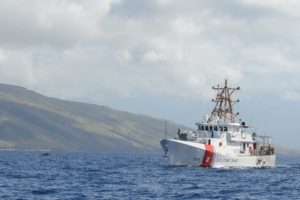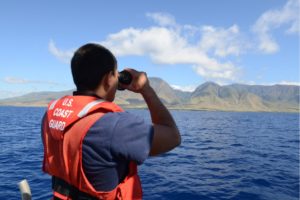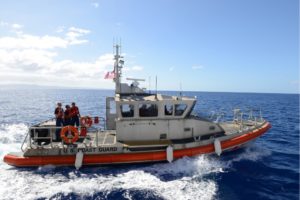10th Annual Operation Kohola Guardian
In ongoing support of Operation Kohola Guardian, Coast Guard crews conducted patrols off Maui Tuesday, Jan. 16, 2018.
Operation Kohola Guardian, typically run for the first several months of the year, is a cooperative effort between state and federal agencies to reduce risk to mariners and to whales in Hawaiian waters while supporting conservative efforts to ensure future generations have the opportunity to experience these animals in their natural habitat.

The U.S. Coast Guard Cutter Oliver Berry (WPC 1124) crew patrols off the coast of Maui during Operation Kohola Guardian, Jan. 16, 2018. Operation Kohola Guardian is a cooperative effort between state and federal agencies to reduce risk to mariners and to whales in Hawaiian waters while supporting conservative efforts to ensure future generations have the opportunity to experience these animals in their natural habitat. (U.S. Coast Guard photo by Petty Officer 3rd Class Amanda Levasseur/Released)
Through recreational boardings and outreach, the crews of Coast Guard Cutter Oliver Berry (WPC 1124) and a Coast Guard Station Maui 45-foot Response Boat-Medium, informed multiple vessel masters operating in the Hawaiian Islands Humpback Whale National Marine Sanctuary of the requirements to maintain a safe distance from whales and not impeded the whales’ path.
An MH-65 Dolphin helicopter crew from Coast Guard Air Station Barbers Point also conducted an aerial patrol to report sightings of vessels getting too close to whales to the cutter and boat crews for outreach opportunities.
Every year humpback whales migrate to Hawai‘i to find mates and give birth. The main Hawaiian Islands may contain the largest seasonal population of North Pacific humpbacks in the world. Of the 21,000 humpback whales in existence, the population that uses Hawai‘i’s waters as their principle wintering ground is projected at more than 10,000 animals. The North Pacific stock is considered recovered and no longer endangered, but they are still protected under the Marine Mammal Protection Act.

Fireman Machinery Technician Wayne Pagan looks for humpback whales off the Coast of Maui during Operation Kohola Guardian, Jan. 16, 2018. Operation Kohola Guardian is a cooperative effort between state and federal agencies to reduce risk to mariners and to whales in Hawaiian waters while supporting conservative efforts to ensure future generations have the opportunity to experience these animals in their natural habitat.(U.S. Coast Guard photo by Petty Officer 3rd Class Amanda Levasseur/Released)
“Operation Kohola Guardian was designed for the Coast Guard to partner with DLNR and NOAA to inform the public of the regulations governing interaction with protected marine species and deter operators from deliberately getting close to these animals, which is illegal and dangerous,” said Lt. j.g. Brian Waters, Sector Honolulu enforcement. “The goal of this operation is to inform the public and promote responsible use of the waterways during the annual migration and concentration of humpback whales within the waters off Maui.”

A 45-foot Response Boat-Medium boat crew from Station Maui patrol off the coast during Operation Kohola Guardian, Jan. 16, 2018. Operation Kohola Guardian is a cooperative effort between state and federal agencies to reduce risk to mariners and whales in Hawaiian waters while supporting conservative efforts to ensure future generations have the opportunity to experience these animals in their natural habitat. (U.S. Coast Guard photo by Petty Officer 3rd Class Amanda Levasseur/Released)
Mariners and visitors are reminded:
- Keep a sharp lookout — vessel operators should always stay vigilant for whales and other collision hazards. Look out ahead for puffs of mist, dorsal fins, tails, etc. Operators are further advised to post at least one dedicated whale lookout, in addition to the operator, from November through May.
- Watch your speed — the Coast Guard recommend vessels travel at a slow, safe speed in areas where a whale strike may occur. This speed depends on vessel type, time of day, sea conditions, and other factors that affect whale detection and avoidance. Research shows that collisions occurring at vessel speeds above 10 knots cause more whale deaths and serious injuries than collisions occurring at slower speeds.
- Stay at the helm — keep hands on the wheel and throttle at all times, and be ready to take action immediately to avoid a whale in your path.
- Keep your distance — once whales are sighted, stay more than 100 yards away.
- Stop immediately — if within 100 yards or less of a humpback whale. Leave engines running, out of gear (in neutral) until the whale moves away.
- Pass astern of whales —wWhile maintaining more than 100 yards distance, if you encounter whales in your path, do not attempt to run out in front of whales to get past them.
- Warn other vessels — use appropriate VHF radio protocol or other means to alert other vessels that may not be aware of whales in their path.
- Don’t assume whales see you or will move — calves are especially vulnerable since they are curious and may not have learned to be cautious of vessels.
- Plan ahead for delays — avoiding whales may take time. Build in some buffer and avoid nighttime operations if possible.
- Call the NOAA Hotline if involved in a collision at (888) 256-9840 — if a phone call is not possible, hail the Coast Guard on VHF channel 16.
- Hands off — never touch, handle or ride marine wildlife. Touching wildlife, or attempting to do so, can injure the animal, put you at risk and may also be illegal for certain species.













